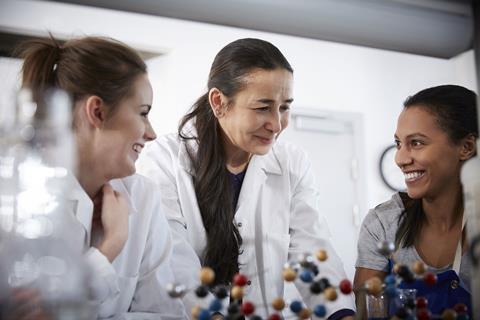Let your science students know that teaching is a first-class option

England, along with many other countries, is experiencing a severe and long-term science teacher recruitment crisis. Fact. According to the latest government data, less than half of the new STEM teachers required were recruited to postgraduate Initial Teacher Education in 2023/24. In chemistry, only 65% of the new specialist teachers needed joined the profession.
This science teacher shortage can negatively impact students’ attainment, and means many who do join the profession teach outside of their subject specialism. As a result, we urgently need to understand how to successfully recruit more science teachers.
A back-up career?
To teach or not to teach, that’s the question! One assumption is that science graduates don’t become teachers because, on average, PGCE graduates earn less than their peers with only an undergraduate degree. Yet, my PhD research found that many more young people are interested in becoming teachers than is reflected in teacher recruitment data. Analysing more than 60,000 survey responses from the ASPIRES research project, I discovered that more than one-third (36%) of young people between the ages of 13–14 and 21–22 reported that they were open to teaching.
If such a high proportion of young people are open to teaching, why do we still have a teacher recruitment crisis? Using qualitative data spanning 11 years, my research found that teaching is a common back-up (or second choice) career aspiration, especially among science undergraduates.
Promisingly, this finding suggests that potential science teachers are not completely disinterested in teaching. None of the young people in my sample expressed that they would not teach because of the salary, for example.
Instead, they told me they wanted to first experience non-teaching careers because they saw teaching as a safe and easy-to-access route that would always be available to them. In contrast, non-teaching science careers were perceived to be more high status and, specifically, more highly skilled than teaching. I suggest that this is linked to the notion that teaching is often a natural ‘vocation’ or ‘calling’, rather than a job requiring professional expertise one can develop with specialised education and experience.
Change the narrative
So, what can we do to encourage science undergraduates to see teaching as a desirable first-choice option? Interestingly, a big influence on participants’ views of teaching was their own school experience. This suggests that the current science teacher workforce could have a role to play in shifting or adjusting young people’s views of teaching.
Educators could potentially help shift perceptions of science teaching by offering informal teaching-type experiences, like tutoring younger students. While not all of those in my study who had encountered this sort of experience went on to become teachers, all who did enjoyed these encounters and said they better understood and appreciated some of the behind-the-scenes work of teachers.
Another recommendation from my research is to improve careers education, information, advice and guidance (CEIAG) about the teaching profession. All the science undergraduates in my study reported that neither their schools nor their universities mentioned becoming a science teacher as a career route they could go on to pursue. Instead, schools and universities guided all of them towards postgraduate science study. Perhaps if more science students were considered as potential science teachers by these learning hubs, more young people would consider themselves as potential future teachers, too.
Of course, educators are not the only ones who can influence a shift in the narrative about science teaching. Parents, policymakers and the media all need to play a role in showcasing the position of science teaching as a highly skilled and educated profession, rather than something one is ‘called’ to do. This research suggests that many young people consider teaching as a career, so part of the answer to how to improve science teacher recruitment could specifically lie in repositioning how we present the profession compared to non-teaching science roles.
Emily MacLeod is a researcher at IOE, UCL’s faculty of education and society











1 Reader's comment